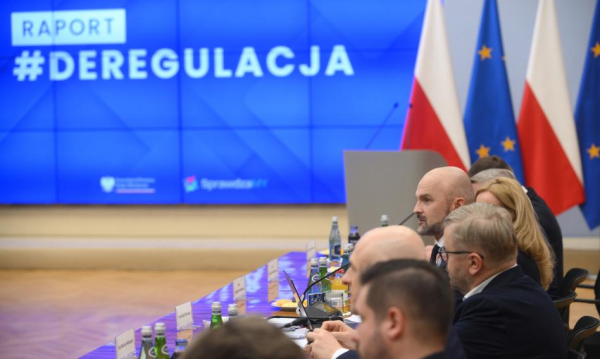Less bureaucracy, more flexibility – these are the main assumptions of the SprawMY Initiative, which proposes a package of deregulations improving the functioning of the Polish labor market. The changes are to include, among others, remote work, employment of specialists in schools, health and safety procedures, storage of employee documentation and digitalization of HR processes.

The team of experts from the WiadomościMY initiative presented a number of deregulation proposals aimed at reducing administrative costs, increasing the efficiency of companies and better adapting regulations to the needs of employers and employees. They concern, among others, remote work, employing specialists in education, health and safety procedures, storing employee documentation and digitizing intra-company communication. The common denominator of these actions is reducing unnecessary bureaucracy, increasing flexibility and adapting regulations to the realities of the modern labor market.
Remote work is more flexible
One of the key proposals is to simplify the regulations on remote work . As Ryszard Chmura, a member of the Steering Committee of the SprawMY Initiative, notes, the current regulations are scattered, unclear and overly complicated – especially for small and medium-sized enterprises.
See alsoHow artificial intelligence will affect the work of accountants
– We want to organize the rules and facilitate the entire procedure so that both employers and employees can use it in a predictable and transparent way – Ryszard Chmura tells Bankier.pl. – Many unnecessary formalities will disappear, which will reduce costs and the risk of disputes, and increase the availability of this form of work.
Greater availability of specialists in schools
The changes are also to cover the education sector. Current regulations limit the possibility of employing specialist teachers, including psychologists, speech therapists, therapists, on the basis of civil law contracts to only 4 hours per week. According to experts from the Education Team, Robert Górniak and Jarosław Pytlak, this effectively discourages many specialists from cooperating with educational institutions, especially in smaller towns.
The SprawiedMY proposal assumes increasing this limit to 9 hours per week , which will allow for more flexible forms of employment without the need to conclude an employment contract.
Health and Safety: Less Paperwork, More Safety
Much emphasis was also placed on simplifying post-accident procedures and occupational risk assessments . Dr Marcin Wojewódka, an expert in labour law, emphasises that the current regulations require full proceedings even in the case of minor incidents.
– This diverts resources from real threats. We propose that simplified procedures should apply where no injury has occurred – explains Dr. Marcin Wojewódka to Bankier.pl. The expert also advocates introducing a single, unified post-accident form – regardless of the type of contract. In his opinion, this would simplify formalities and reduce the risk of errors.
Employee files and leaves – shorter, faster, simpler
Another significant change is to shorten the retention period for employee files from 10 to 5 years and simplify the rules for paying compensation for unused leave. As Agnieszka Sobota from the Labor Code Team notes, the proposed changes are to both reduce the costs of storing documentation and increase compliance with personal data protection regulations.
In turn, the new model of paying the equivalent – together with the salary on a standard date, and not at the end of the contract – is intended to simplify HR and payroll processes and reduce the risk of violations of labor law.
Digitalization of HR: potential savings counted in hundreds of hours
The latest deregulation package focuses on the digitalization of HR processes. As Ryszard Chmura reminds, today as much as 70 percent of HR formalities in companies are done in paper form. The introduction of full digitalization (e.g. leave applications, changes to contracts or signatures) could bring savings of up to 230 hours per year to a company employing 50 people.
At the same time, the PrzepisyMY initiative proposes the unification of electronic signatures – equalising the status of a trusted profile, a mobile personal signature and a qualified signature.
– This can save citizens and companies up to 6–8 hours a year, which they currently waste on analysing which signature is correct – says Ryszard Chmura.
There is no need for so many formalities
The changes proposed by the initiative WiadomościMY are a response to the challenges faced by both entrepreneurs and employees. Eliminating unnecessary barriers, simplifying formalities and increasing flexibility in employment and documentation can significantly improve the efficiency of the labor market in Poland.